Everything you need to know about building site surveillance
There is a lot more to building site security than simply deterring criminals.
A security system that tries to keep our criminals but gives up once they have managed to find their way onto the property is pretty useless and is asking for trouble in the long-term.
You need active security that deters criminals, detects those who do manage to gain entry, AND helps to identify them and track them down if they manage to get in and out without being detected.
Surveillance is key, not only in terms of CCTV but also in terms of physical security guards with an expertly honed eye for trouble and even security dogs that have a highly attuned sense of smell and hearing.
In this blog we will go through some of the most effective tools in the building site surveillance toolbox and help you create a security system to be proud of that will protect your assets for the duration of the project.

Building Site CCTV
CCTV is key to building site security. Some security measures are optional on infrastructure projects and property developments but CCTV is not one of them.
If wired CCTV cameras are not an option there are plenty of mobile temporary solutions that are and there is simply no excuse for failing to put your property under video surveillance 24 hours a day.
CCTV is a fantastic deterrent to intruders. You know just how effective it is and so do criminals who will go nowhere near your site once they see your cameras if they have any sense about them.
CCTV cameras aren’t only an asset for your security staff either and can help to optimise your project management as well.
By monitoring progress via security cameras, you or a fellow building site manager will be able to determine exactly where resources need to be and when and ensure that assets are never left lying around not in use when they could be used elsewhere.
They also allow you to track progression from afar meaning that even if you can’t make it to the site on a certain day you can still make changes that improve productivity.
CCTV towers
When it comes to temporary CCTV for construction sites, CCTV towers are in a league of their own.
These cutting edge systems require no electricity and can be placed anywhere on your site, providing immediately 360 degree 24/7 coverage of a large area of land.
These systems have all the frills you would expect from a modern security system including mobile remote monitoring and automatic motion detection alongside a range of smart AI features such as virtual tripwires that maximise their effectiveness.
If you choose a monitored CCTV system it will not only identify intruders but also alert a local security firm to their presence and deploy a mobile response unit immediate to your location. Once on site the security professionals will conduct a full sweep of the premises to determine if the risk is genuine.

